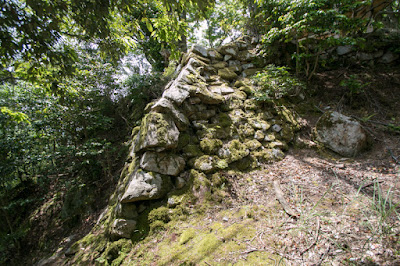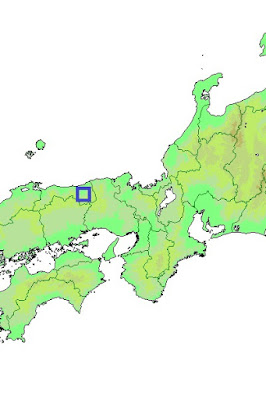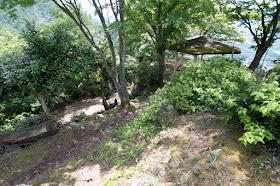Kageishi Castle
-Petit size stone built castle depicted in military tale-
Overview
Name: Kageishi castle (Kageishi-jo)
Alias:
Place: Mochigase-cho Tottori city, Tottori
Type: Mountain Castle
Built: 16th century
Remaining remnants: Stone walls, clay walls and dry moats
Title:
Brief History
Kageishi castle (景石城) is located at a corn shaped peak of 300 meter above sea level prolonged from Sankakuyama mountain, at the east of Mochigase town. Mochigase town is the one located at the meeting point of Chiyoagawa river which flows northward from Chugoku mountain toward Tottori plain, and its tributary Sajigawa river.
As roads of this area runs along the river, Mochigase town is a meeting point of Inaba Kaido road, which was an important road connected Sanyo region and Sanin region from western part of Harima province (Hyogo prefecture) to Tottori area passing Shitozaka Toge pass and Chizu valley, and path from Mimasaka province (north part of Okayama prefecture) through Ningyo Toge pass communication.
Two major military tales of Japan
Precise year is unknown but Kageishi castle was built by local lord Mochigase clan in the former half of 14th century, at the time of military tale Taiheiki. Taiheiki, is one of the major Japanese military tales along with Heike Monogatari, and treats the history from the fall of Kamakura Shogunate, establishment of the new government of Emperor Godaigo (1277-1339), split of Imperial Household after the leave of Takauji Ashikaga (1305-1358) from new government and build of Muromachi Shogunate, to merger of two Houses.
Comparing these two stories, Heike Monogatari has a simple structure. It treats transitory of things, from confrontation of Taira clan, which once reached its peak and achieved everything but lost its momentum and finally disappeared into the sea, and Minamoto clan, which once mostly ruined by Taira clan but recovered and finally ruined. In addition to Heike clan, many people at winning Minamoto clan such as Yoshitune Minamoto (1159-1189) or Yoshinaka Minamoto (1154-1184) also died in tragic doom, and this emphasized tragic atmosphere of the story.
On the other hand, reflecting confusing situation of the era, Taiheiki had a complex structure and difficult to grasp. Once Emperor Godaigo and Takauji Ashikaga cooperatively corrupted Kamakura Shogunate, but new government of the emperor ended in failure thus endless conflict between Emperor and Muromachi Shogunate built by Takauji began.
Furthermore, both side had a complex problem between members that caused internal conflicts, and adding remnants of former Kamakura Shogunate, many people died in confusion. But different from resignation seen in Heike Monogatari, people of this story betrays their relative and boldly allies with enemy, shows toughness, craftiness and wildness somehow to survive this decadent era.
Rise and fall of Yamana clan
According to Taiheiki, Tokiuji Yamana (1303-1371) who was a close retainer of Takauji Ashikaga, activated in the battle with Kamakura Shogunate or Emperor Godaigo army and became the governor of several provinces including Inaba province (Tottori prefecture) at Sanin region. But facing internal conflict in Ashikaga clan, Yamana clan changed to Emperor Godaigo side and once attacked Kyoto city which was the main base of Ashikaga Shogunate.
In 1356, Muromachi Shogunate ordered Akamatsu clan which was the governor of Harima province (Hyogo prefecture) to attack Yamana clan, and Akamatsu army intruded into Inaba province captured several castles including Kageishi castle. But five years later, Tokiuji recovered Kageishi castle. Several years later, Yamana clan changed to Muromachi Shogunate again, keeping their large territory spread into major part of Sanin region.
Since then Yamana clan kept Inaba province over 200 years, but significantly lost its power by endless internal conflict and external pressures. Mochigase clan had been one of the important retainer of Yamana clan and also kept Kageishi castle. But in 1580, Hideyoshi Toyotomi (1537-1598) who was still a regional commander of central ruler Nobunaga Oda (1534-1582) intruded into Inaba province. Hideyoshi once captured Kageishi castle along with Tottori castle (Tottori prefectue), and placed his retainer Toyonao Isobe (?-?).
Capture and reform of the castle
This time Mouri clan which was strong enemy of Oda clan promptly attacked Tottori castle and seized it. At this time, utilizing absence of Toyonao Kageishi castle was also captured by Mouri side retainers of Yamana clan. But next year, Hideyoshi attacked Tottori castle by starving out tactics and fell it, thus Toyonao also returned to Kageishi castle.
At this time Mochigase area is an important connecting point between Himeji castle (Hyogo prefecture), the main base of Hideyoshi and Tottori castle, a front side base at Sanin region, and Hideyoshi might strengthen Kageishi castle to secure the communication route.
Under Toyotomi government, Toyonao kept Kagenao castle and was attached to Shigekata Kinoshita (1548-1600) who was the lord of Wakasa Onigajo castle (Tottori prefecture). Toyonao was a small lord of 3,000 Koku (unit of rice cultivation), it was rather a large manor than feudal lord. But utilizing the position at the side of important road, Toyonao built a town which was the origin of current Mochigase town, and also reformed Kageishi castle into a modern castle with stone walls.
Structure of Kageishi castle
The basic structure of Kageishi castle is not so different from its origin at medieval era, with terraces of 20 meter or 30 meter long spreads from the peak along the ridge. As it stands on prominent peak, each terraces are small one of about 20 meter long and built at different levels. Because of the shape of the mountain and limited budget, Toyonao could not expand the castle well.
However, utilizing rocky ground of the mountain, core areas of this castle were covered by stone walls even though low and rough one. Entrance into secondary area has a most primitive stone wall, which might be built at first when this castle was captured by Hideyoshi. On the other hand, from the western line of central area which directly faces castle town to southern line, there remains the ruin of higher and newer stone wall with clearer edge which might be built under Toyonao Isobe. Toyonao also built his residence ground built with stone wall at the hillside.
Afterward of castle
Toyonao held Kageishi castle nearly 20 years, but after the death of Hideyoshi in 1598, Toyonao lost his territory and castle as a result of the battle of Sekigahara. Kageishi castle was managed by Iemori Yamazaki (1567-1614) who became the lord of neighbor Wakasa Onigajo castle, but was abolished by Ikkoku Ichijo Rei (One domain one castle rule) published at 1616. But lacking its castle Mochise town had been an important posting town of Inaba Kaido road throughout Edo era.
Today there was no building but half broken stone wall still remains on the mountain with wrecks of stones. Combination of river, railroad and new highway run the valley and seen from the castle clearly shows Mochigase area had been an important area of communication from past to now. Mixture of rocky stone, pine trees and stone walls on the mountain expresses also expresses long history and unchanged necessity of Kageishi castle from the time of medieval military tale to just before of modern period, corresponding to the view of hillside.
Access
20 minutes walk from JR West Inbi-sen line Mochigase station to hillside entrance of climbing road. 20 minutes drive from Tottori Jidoshado Expressway Chizu interchange. 30 minutes walk from hillside entrance to hilltop castle.
Related Castles
Wakasa Onigajo Castle -Picturesque ruin of castle on mountain-
Tottori Castle -As secure as guarding general's will-
Himeji Castle (1) -Castle of Kanbe and Hideyoshi-




































































































No comments:
Post a Comment